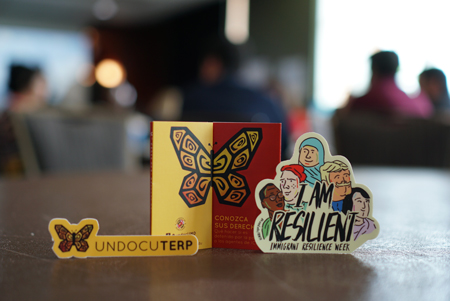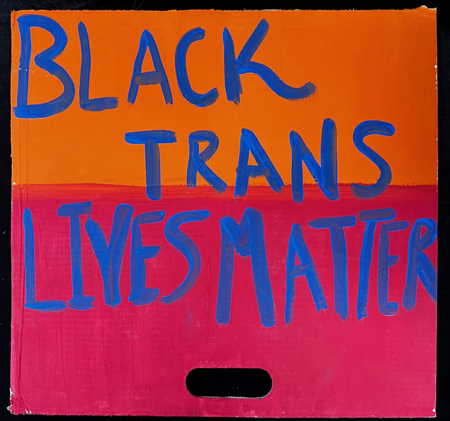Activism in the 2000s
A Change is Gonna Come
Meeting at the Intersections of Hope, Justice, and Solidarity
Rising up in defense of the humanization of Black and Brown bodies, Queer and Trans communities, bodily autonomy, the re-examination of the carceral state, the push for prison abolition, demands to stop the idolization of confederate statues, and the security of voting rights defined so much of the student organizing throughout the 2000s. Social media helped democratize narratives as activists utilized platforms such as Twitter, Instagram, and YouTube to counter the reports by local, state and federal officials.
The Arab Spring Uprisings of 2012 and the Black Lives Matter Movement of 2013 provided some of the earliest examples of activists using social media platforms, which helped lay the foundation for hashtags like #SayTheirNames, #DreamAct, and #FergusonUprising. These digital movements were a virtual call and response, assisting in igniting direct action in communities throughout the U.S.
In the summer of 2020, the murder of George Floyd, following the killings of Breonna Taylor and Ahmaud Arbery, led to what may be considered one of the largest protests in U.S. history. Fifteen to 26 million participants engaged in these protests, many of these demonstrations led by student organizers. Students held their academic institutions accountable, renewing demands for more inclusive campuses, the development of policies that address anti-blackness and hate crimes, and severing ties with police departments.
For the last twenty-three years, students at the University of Maryland have built on the work of those leaders that came before them, including C.O.R.E., the Student Homophile Association, the first Black Student Union, the American Indian Cultural Society, the Hispanic Student Union, the Asian Student Union, and all the other unknown voices that reimagined futures for communities of color and other marginalized student populations.

Immigrant Resilience week, 2019. Undocumented Students Program records.

Black Trans Lives Matter handmade sign, undated. Benjamin Scott Blake collection.
University of Maryland students have been at the forefront of ensuring a space for marginalized communities with the push for the LGBTQ+ Equity Center, investigations into buildings that bear the names of confederates and segregationists, advocacy for women’s bodily autonomy and reproductive justice, the dissolution of institutional connections with prison labor, and the reimagination of a safe campus in the wake of the deaths of Lt. Richard Collins and Jordan McNair. From protest to progress, UMD student organizing has assisted in changing the trajectory of our campus.
#StandUpForAAPI
#WeKeepUsSafe
#JM79
#Justice4Jordan
#Justice4RichardCollins
#ADifferentUMD
#UMDNotAHome
#HearTheTurtle
#RenameByrd
#BlackOnCampus
#UMDStandsWithYale
#ProtectUMD
#UndocUMD
#HomeIsHere
Timeline
-
November 21, 2015
On the heels of the dedication of Frederick Douglass Square, students lead a protest to remove the name of former University president and segregationist Harry Clifton “Curley” Byrd from the University stadium. In December 2015, the UMD Board of Regents voted to change the name.
-
2017
Students advocate for support due to concerns of looming federal policy changes influencing immigrant/mixed-status students.
Laura M. Bohorquez Garcia becomes the inaugural Undocumented Student Program Coordinator.
-
May 2017
A former UMD student stabs and kills Bowie State student Lt. Richard Collins, III at a campus bus stop.
-
June 13, 2018
Jordan McNair, an offensive lineman at UMD, passes away after suffering from heatstroke during an off-season workout two weeks earlier.
-
November 2018
Hundreds of students rally and demand justice for Jordan McNair in front of the McKeldin Library and the campus Administration building.
-
June 2020
UMD students participate in regional protests in the aftermath of George Floyd's murder.
-
December 2020
The University names new residence halls after trailblazers who helped diversify the campus.
- Johnson-Whittle Hall honors Hiram Whittle, the first African American man to be admitted to the university and Elaine Johnson Coates, the first African American woman to graduate with an undergraduate degree.
- Pyon-Chen Hall honors Pyon Su, the first Korean student to receive a degree from any American college or university and Chunjen Constant Chen, the first Chinese student to enroll at MAC.
-
April 30, 2022
Students march across campus in response to legislation passed in many states that bars the discussion of gender identity and sexual orientation in schools.
-
May 2022
Lt. Richard Collins, III Plaza is unveiled due to the partnership between Bowie State and UMD and advocacy by student organizers.
-
June 29, 2023
The U.S. Supreme Court’s 6-3 decision to roll back affirmative action ends a four-decade precedent granting universities the ability to use race as part of their admission process. This decision is the result of lawsuits accusing Harvard University and the University of North Carolina of racial discrimination in their admissions process.
University of Maryland Terps will not go backward!

